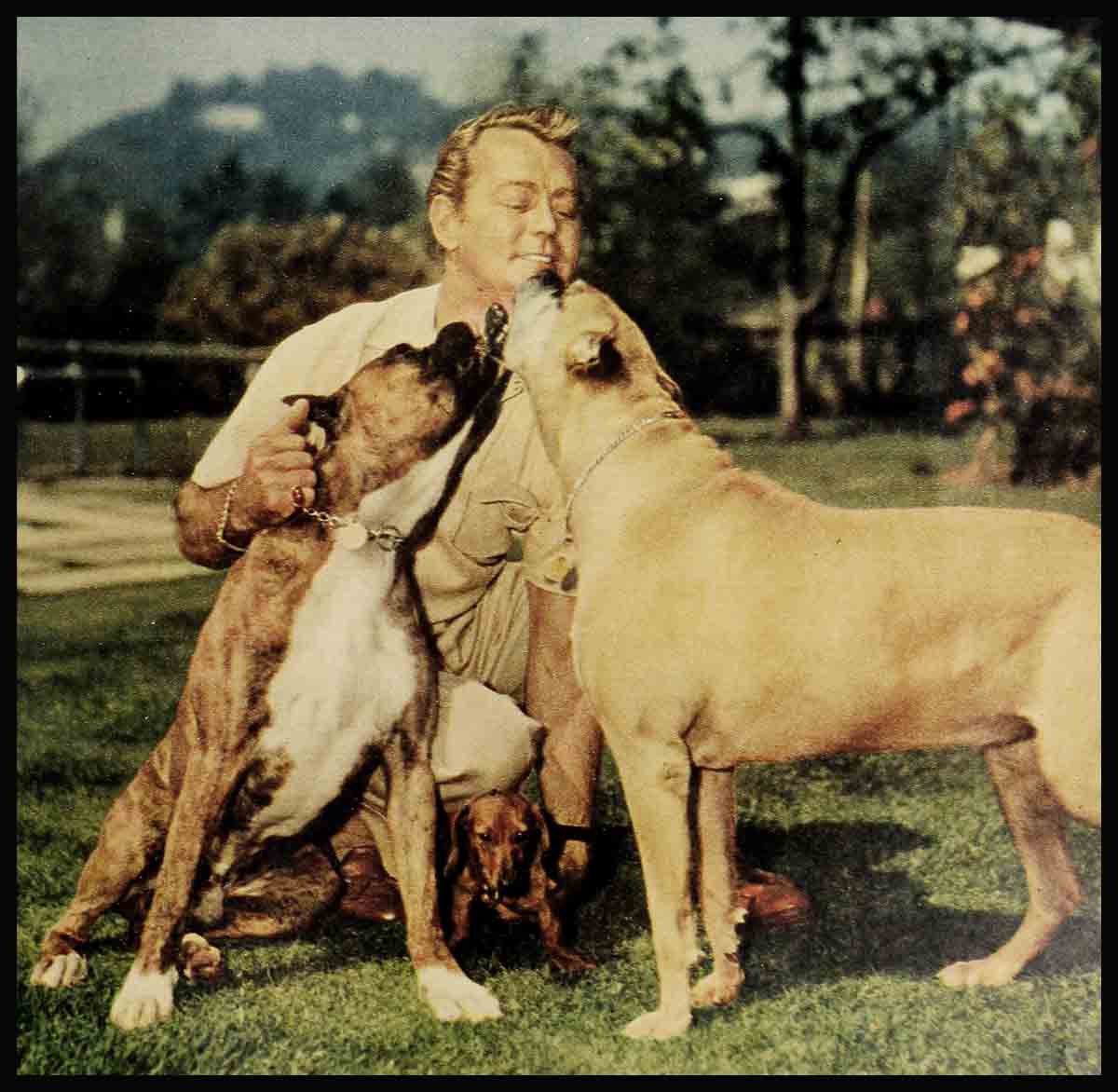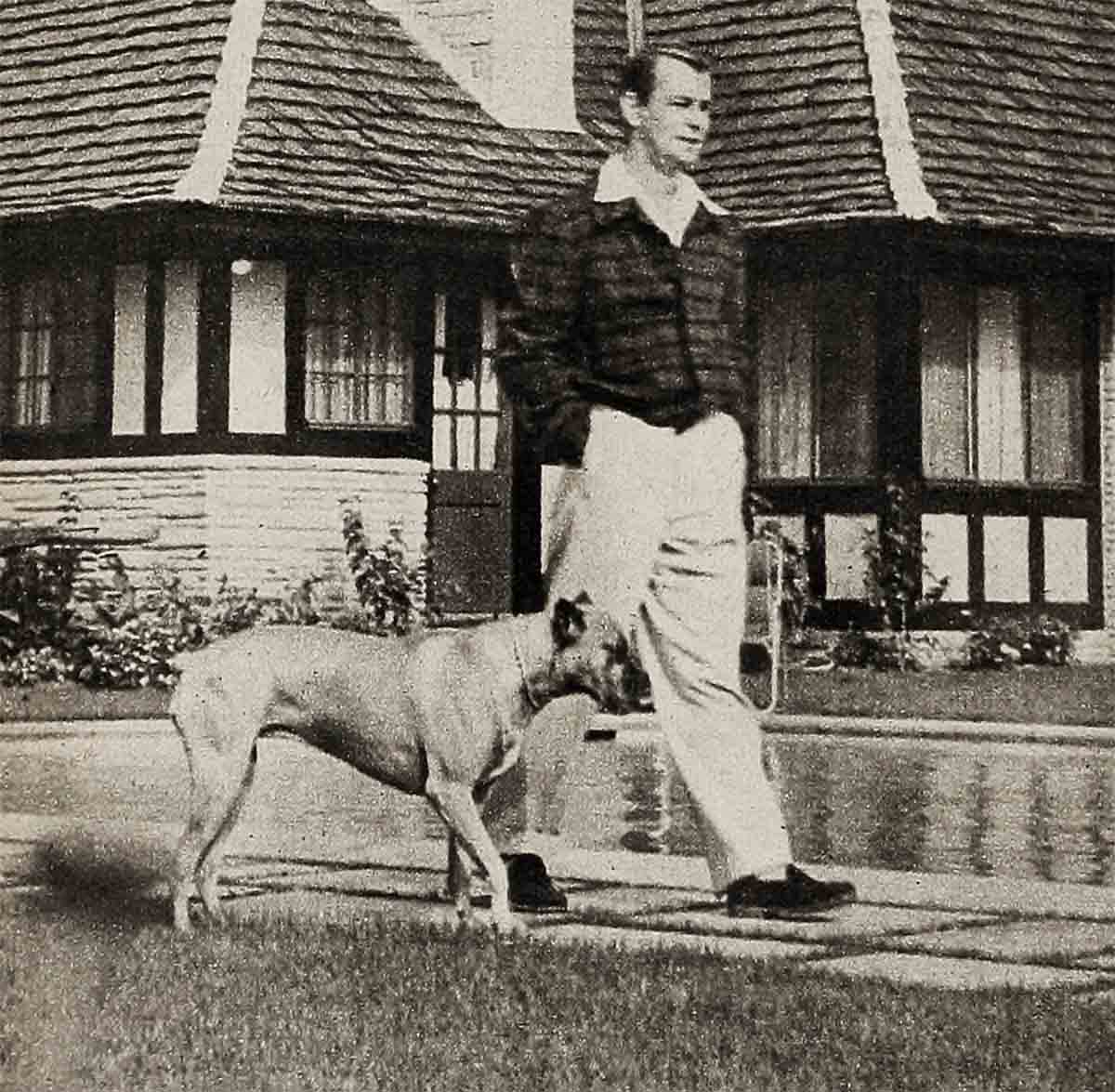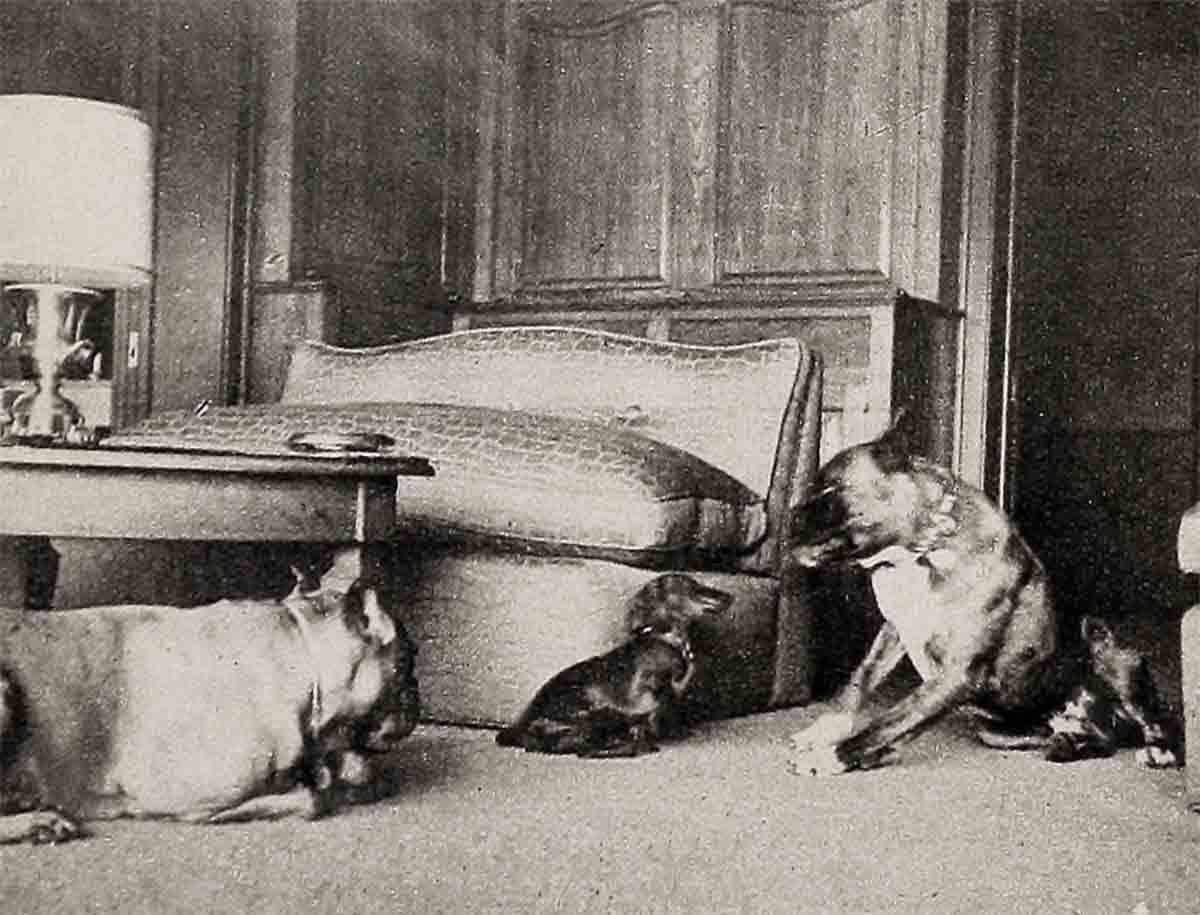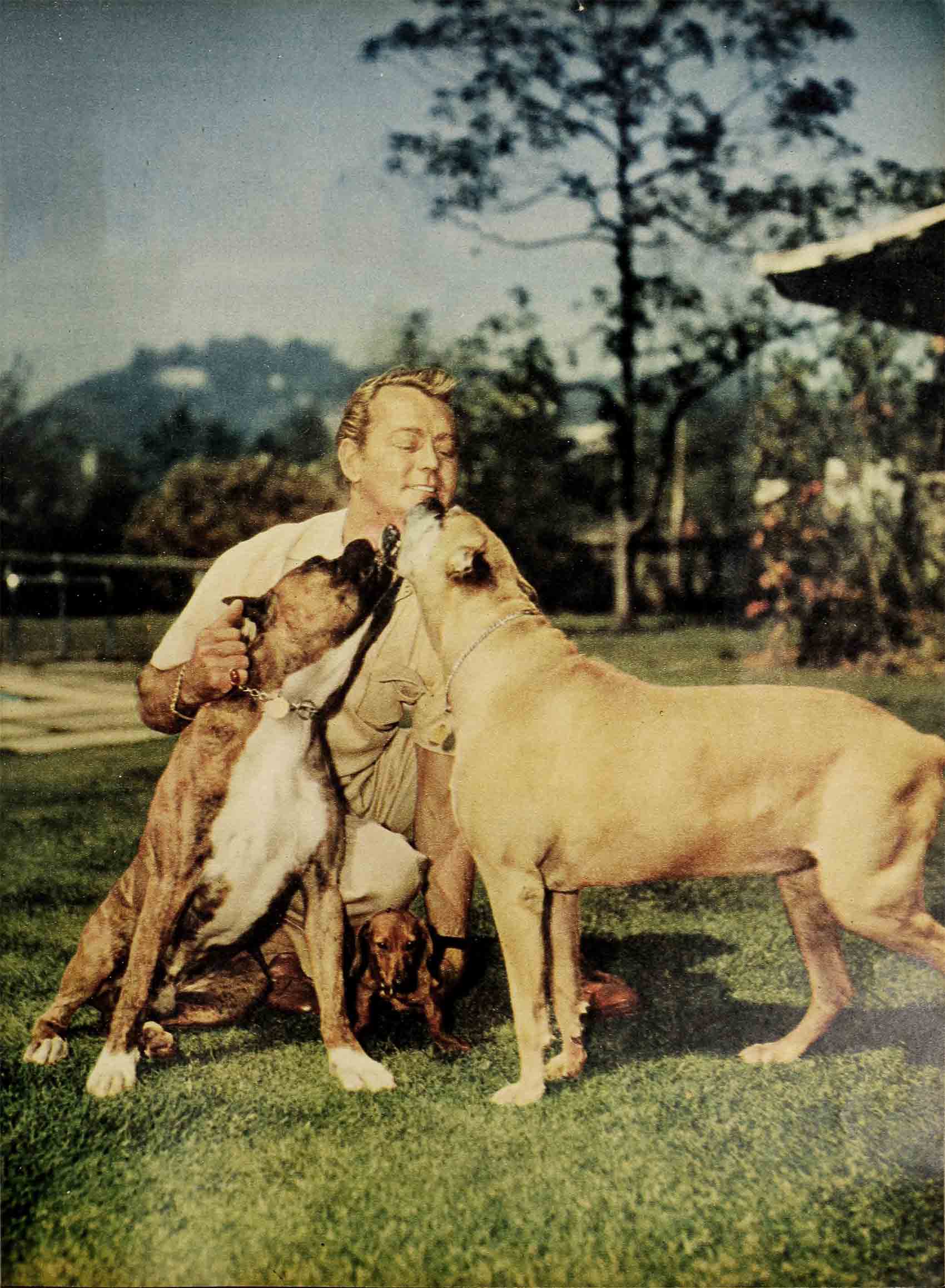
Alan Ladd’s A Big Baby!
The business about dogs was decided right off by the Alan Ladds; and it didn’t take more than ten seconds. It was the day the Ladds moved into their present home. More than a year of planning and building had gone into the house and grounds, for this was the place Alan and Sue knew they were going to live in for the rest of their lives. And as they turned in from the street and onto the black top driveway, they liked what they saw. The whole family was along—Carol Lee, Laddie, Alana and little David and Jezebel, a large boxer dog.
The Ladds got out of the car, inhaled the fine clean air of their hilltop and admired the flowers in the beds that flanked the house. Then, in a body, they marched to the front door and Alan inserted his key beneath the fancy brass door knob. The kids pushed open the door and scampered inside. Alan and Sue took a little longer, because this was their dream, and they stood just inside the entrance letting the magnificence of the house seep in. The living room was to the right, like something out of a picture book. The dining room, with its long table was to the left and beyond that the playroom. Before them, facing on the garden and pool was a sitting room, carpeted in a soft grey and furnished with fat, puffy sofas and a pair of splendid black coffee tables.
Everybody took it big but Jezebel. She walked slowly around the room for a moment, sniffing at the strange things there, and then, on a doggish whim or in an instant of uncertainty, she tried a small section of the living room rug for absorbent qualities.
The howl from Sue Ladd’s lips could have been heard a block away. Jezebel leaped ten feet and took off with Sue after her. The occasion, in a fraction of a second, changed from a glad entry into a new life into a dog hunt, with everyone but Alan joining in, and Jezebel scurrying about like a cornered pony in a tea shop. As she passed him for the third time, Alan grabbed Sue.
“Now, hold on a minute, honey,” he said. “Do you like that dog?”
“Of course I do,” wailed Sue, “but did you see what she just did to my new rug?”
“Sure I did,” said Alan, “but there’s one thing we have to make up our minds about right now. Dogs will always be a part of our life and our home. Now this place has to be either a show place or a home. What’s it going to be?”
Sue stopped breathing hard—she knew Alan was right. Now was the time to make the decision.
“A home,” she said.
And that’s the way it has been ever since.

It would be impossible to visit and talk with Alan Ladd for any length of time without getting on the subject of dogs, because while you are sitting in his house or garden they are all over and around you. And yet Alan is not in the accepted sense a “dog-lover.” As defined once by James Thurber, a dog-lover is a man who loves someone else’s dog, and while Alan is fond of all canines, he showers his affection only on his own. The last count at the Ladds’ showed there were three animals residing in his Hollywood home, Jezebel, a younger boxer named Brindie and a small dachshund named Fritzie, II. There are generally anywhere from five to 20 more dogs at the Ladd ranch, depending on the date of the last whelping, but they are there only on a temporary basis, awaiting new and permanent homes. The pets are the three house dogs.
The Alan Ladds first became prominent in the Hollywood doggie set when they acquired Jezebel, who was a present from Paramount executive Y. Frank Freeman. Jezzie was a simple puppy, lovable, co-operative and not too frisky. Except at night. The first night she spent with the Ladds she was put tenderly to bed in a bathroom on a 30 dollar blanket because it was too cold for her to sleep outside.
Alan had just dropped off to sleep when he was startled into full wakefulness.
“What was that?” he whispered to Sue.
“What was what?” asked Sue.
“I just heard somebody cry for help,” said Alan.
They both listened and the cry came again.
It was presently obvious that the noise was coming from the bathroom, so Sue and Alan got up and opened the door. Jezebel sat there wagging her tail apparently in the best of health and spirits.
“She must have had a bad dream,” said Alan. So they got back into bed.
Jezebel had bad dreams all night—and Alan went to work the next day with his eyes half closed. He decided to ask wiser heads for advice and went home that night filled with dog lore.
“It’s a simple matter,” he told his wife. “All you have to do to keep the pup from crying is put an alarm clock beside him.”
“What for?” Sue asked.
“What difference does it make?” Alan said. “I got this from a guy who’s had maybe 20 dogs. He ought to know.”

Jezebel and the alarm clock went to bed nicely and Sue and Alan settled down for a sound night’s sleep. But Jezebel had another night of howling and the next day Alan was as tired as a man can be. He met a man that day who told him that all the pup needed to calm him down was the blanket he was born on. Alan was willing to do anything, so after an hour of telephoning, he located the blanket and drove 30 miles out into the country to get it. And when they got into bed that night, Sue and Alan dropped right off to sleep.
The howling started five minutes after the sandman had been by. Alan leaped out of bed, raced to the bathroom, picked up the pup, tore back to the bedroom—and threw the dog into the bed.
“She wins,” he said to Sue. Jezebel has slept in that bed every night since without a whimper. The climax came one night a year or so later, when Jezzie weighed better than 100 pounds. Alan was awakened by a howl and a loud thump. He turned on the light and saw Jezebel, comfortable and calm, her head on Sue’s pillow—and Sue on the floor where she had been pushed by her pet. The next day they got a bigger bed.
If you have the space for it, it is no more possible to own one dog than it is to have one flea. They get in your blood or you begin to feel sorry for the first dog because she’s lonely or you’d like to have pups. The Ladds bought another boxer to play with Jezebel—and she promptly showed her true nature by delivering a litter of pups, something like ten. Then, hearing that Sue and Alan loved boxers, people began giving them their unwanted animals.
Jerry Lewis, for instance, had a dog called Irma, given to him by Victor Mature. One day Irma found out she could jump fences, so whenever she felt cramped for space she would take to the air and rip off into the neighborhood where she would accomplish all sorts of damages until caught. When Jerry finally got an eight foot high fence all around his place and Irma took it like a kangaroo stepping over a cigar box, the comic decided to dispose of her.
“Let’s give Irma to the Ladds,” said Jerry to his wife one night. “They love dogs.”
Irma joined the pack at the Ladd farm and along with her girl friends and cousins proceeded to produce more Boxers. It was like a rabbit farm.

One Christmas, the Ladds decided to give their friends boxers as gifts. This was quite a thing as the strain was now considered the finest in the district. Sue took the pups and tied ribbons about their necks, with cute cards attached, and sent them around to select friends by special pee And everyone was very grateful.
A couple of months later, however, Sue came home pale and trembling.
“I just saw one of the pups we gave away,” she told Alan. “And it has a nose like a collie. Do you think . . . ?”
In a few days they were sure. They visited most of the other recipients of the pets and discovered that the animals were growing into anything but pure-bred boxers. The Ladds were mortified, particularly because of the to-do that had been made upon the delivery of the pups—and the fancy pedigree papers that had been sent to each new owner. But they
faced the problem squarely. They called each of the people and explained that there had been an error in the naming of the father—and offered to take back the off-breed children and replace them. It is a tribute to Hollywood that not a single star or big shot who got the pups would even consider a switch. They were all in love with their collie-boxers.
It is the habit of Sue and Alan Ladd to keep track of the pups they give away. This writer has one of them, a mad, conscienceless beast appropriately named Moose, who, although he is addicted to destroying furniture, eating prize roses and licking the faces of total strangers, is priceless. When the phone rings and it is the Ladds calling, the conversation always begins with: “How’s Moose?”
The ranch is a great place for these animals to run loose and many Ladd boxer owners bring their pets there for a visit to ma and pa and the cousins. Estelle Taylor dropped in one day with her dog for a visit. He was turned loose in the yard and after taking one look at the pack heading for hm for a tussle, took off into the tall brush surrounding the ranch. Estelle called him in vain, then, quite distraught started after him. Alan, being the host, had to go along. This began about three o’clock in the afternoon. Alan and Estelle would get within about five feet of the beast when he would suddenly remember what had nearly happened to him in the ranch yard—and he’d run again. At four the next morning, with Estelle in bad shape because she was sure she’d lost her pet forever, Alan finally caught the thing—and stumbled five miles back to the ranch house where he promptly collapsed.
A week later they were passing Estelle’s house on their way to dinner. They decided to drop in and see if the dog had gotten over its experience. Estelle keeps the dog in her garage when she is not home, so getting no answer to the doorbell, Alan and Sue picked up the garage door to take a look at the pet. Smelling freedom, the animal skipped out into the yard. Alan caught it and shoved it back in the garage, but before he could bring the door down fully the dog slipped out again. Again there was a several-hour ordeal. Every time Alan put the dog back in the garage, it would squeeze out before he could get the door shut. Finally, he was shoving the beast under the door while lying on his stomach in a new suit—and Sue was trying to shut the door fast. This resulted in several near broken bones for Alan, but they never did get the dog back in the garage. At close to midnight, Alan gave up, left the garage door open and went home. Estelle told him the next day that when she got home the boxer was sound asleep in his bed—in the garage with the door wide open.
But of all the dogs the Alan Ladds have owned, a tiny dachshund, Fritzie, was by far the favorite. Fritzie was an animal with personality. She was no bigger than a minute, but she held her own with Jezebel and Brindie with nothing more than an arrogant swagger and a thin growl when it was needed. From the day she first entered the Ladd home, as a six-week-old pup, she slept in the big bed with Alan, Sue and Jezebel down at the foot. She was so tiny she used to get lost in the covers, but when it came time to get up she’d appear from some hidden fold of blankets or from under a pillow and greet the day with a satisfied yawn.
Fritzie was the.life of any party. She was difficult to get to know, but once she’d accepted you she’d show her tricks and conversational accomplishments at the drop of a hat. She was the first to greet visitors and would rouse herself from any nap to see a pal to the door. She had real manners, Fritzie did.
Jezebel had several citations for bravery, for instance the time they were digging for the foundations of the Ladd home and little Alana got in front of a machine that was digging out the side of a hill. She was in a position where the operator couldn’t see her—and he was directing the huge claw of the implement directly at the child. Alan and Jezebel saw Alana at the same instant. Alan started for the kid on a dead run, but Jezzie passed him like a shot. He hit Alana so hard she was knocked ten feet, but she was safe. Jezebel was a heroine, Fritzie was still the queen around the house.
In the scheme of things, Fritzie was just a dachshund who went through life making a study of the human animal. She entered the Ladd home on a trial basis, fully intending, as all dogs do, to run away at the first opportunity if things didn’t stack up to expectations. She couldn’t speak Ladd language, so, thus handicapped, she stuck around a little longer than she might have in order to give this family a fair chance to make an impression. At first, she found the other dogs, Jezebel and Brindie, rather a bore and certainly ungainly and monstrous in their manners.
As she grew older it became no problem for her to rule the roost with her superior intellect—and even in the matter of dog quarrels she managed to impose her will on the boxers by a few well-spoken threats (she did speak boxer language) or the exhibition of a small fang or a disgusted flip of the tail as she waltzed from the fray, refusing to discuss the matter any longer. She contributed nothing to the home—except love, a thing she couldn’t help. And she asked nothing—except love.
And when she died, she left elegantly, expecting nothing more than tears and a last scent of her master.
It was pretty dramatic, the way Fritzie died. Every day, as long as she could remember, a bus had driven by the Ladd home, or rather the home Fritzie shared with the Ladds. A man stood up in front of this bus and as it halted before the Ladd house, announced to his passengers, all sightseers, that this was the residence of the famous movie star. Fritzie found this bit of nonsense an amusing part of her day, so she never failed to be on hand to inspect the passengers and she would trot around and display her best points until the bus drove away. She knew who they came to see.
One day the bus was a few minutes late. Fritzie had trotted off down the driveway to the road and, not seeing the bus, had ventured out into the road to see if it was coming. A car came careening around the corner and before Fritzie could avoid it, she was struck and thrown into the middle of the street mortally wounded. The car drove on.
A few minutes later the sightseeing bus came along, with the man standing up in the front explaining to his fares which star’s home they were approaching. But he didn’t finish his spiel. He saw the small brown object in the road.
He had never been in a movie star’s home before, but the man picked Fritzie up in his arms and walked up the path through the garden to the front door. Alan Ladd answered the bell and took the tiny burden from the man’s hands. It was obvious that Fritzie was beyond help, so
Alan took her into the living room and held her close in his arms while Jezebel and Brindie sat in a far corner and watched in dread.
And then, with a last scent of her master and a final surge of love in her little heart, Fritzie acknowledged that things seemed to have turned out all right after ‘all, and she quietly went to sleep. And long after she was gone Alan’s tears fell on her small face.
There was sadness in Fritzie’s house for quite a while after that. But one day Sue came home with a bundle, shortly after Alan had gone to bed. She walked into the room and tossed the bundle onto the bed, where it began to scamper about like a mouse.
“What’s that?” asked Alan, fully awakened.
“It’s for you,” said Sue. “It’s name is Fritzie.”
The dachshund stopped squirming and looked into Alan’s face—and they grinned at each other. And when the light was put out, Fritzie, the second, got under a pillow and went to sleep, no doubt thinking there’d need to be a few changes made around here.
THE END
—BY JIM BURTON
(Alan Ladd can be seen next in Paramount’s Shane.—Ed.)
It is a quote. MODERN SCREEN MAGAZINE JULY 1952





No Comments